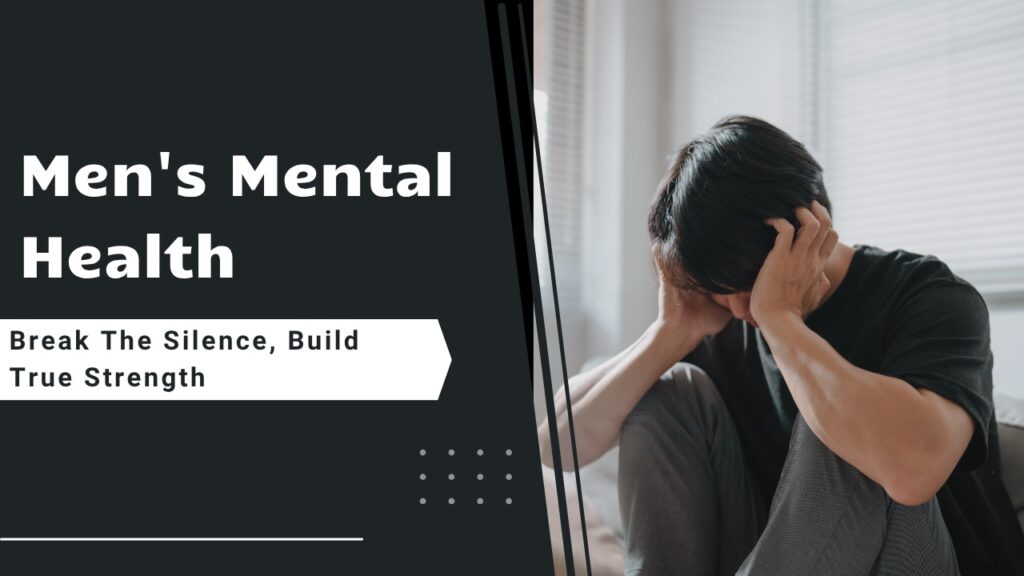Men’s mental health is a vital part of overall well-being, yet it has long been overlooked. Many men grow up with the belief that showing emotion is a sign of weakness. This traditional view of masculinity discourages vulnerability and emotional openness, making it hard for men to talk about their struggles or seek help.
As a result, many men face serious mental health challenges in silence. Issues like depression, anxiety, substance abuse, and suicide are often more prevalent in men because they are less likely to speak up or access support. This silent suffering has become a serious public health concern.
Fortunately, awareness of men’s mental health is increasing. Campaigns, public figures, and mental health professionals are working to challenge outdated ideas and encourage open conversations. Still, there is more work to be done to ensure that men feel safe, supported, and empowered to take care of their mental well-being.
The State of Men’s Mental Health

Globally, mental health disorders do not discriminate by gender — but men are statistically less likely to seek help or receive treatment. According to the World Health Organization (WHO), suicide is one of the leading causes of death among men under 50. In countries like the U.S., U.K., and Australia, men die by suicide at rates three to four times higher than women.
Men are also more likely to turn to substance abuse as a coping mechanism, further compounding mental health issues. Depression and anxiety are often underreported among men due to stigma, lack of awareness, or cultural conditioning that discourages emotional openness.
Common Mental Health Issues Among Men
Depression – Often masked as anger, irritability, or withdrawal rather than sadness.
Anxiety Disorders – Including generalized anxiety, panic attacks, and social anxiety.
Substance Abuse – Alcohol and drug use as a form of self-medication.
Post-Traumatic Stress Disorder (PTSD) – Common among veterans and trauma survivors.
Suicidal Thoughts and Behavior – A rising concern among men of all ages.
Body Image Disorders – Increasing among young men due to media and societal pressures.
Why Men Struggle to Talk About Mental Health
Several societal and psychological factors contribute to men’s silence on mental health:
Cultural Norms: Boys are often taught to “man up,” “toughen up,” or “don’t cry.”
Fear of Appearing Weak: Vulnerability is wrongly equated with weakness in many cultures.
Lack of Role Models: Few public figures openly discuss their mental health journeys.
Limited Support Systems: Men often lack deep, emotionally supportive friendships.
Misunderstanding Symptoms: Mental health struggles may be expressed as fatigue, anger, or physical ailments, and are often misdiagnosed.
Top Tips for Men’s Mental Health
Talk About It – Break the Silence

One of the most important steps in improving men’s mental health is learning to talk openly. Speaking about emotions and inner struggles may not come easily for many men, especially in a society that often values toughness over vulnerability. However, holding in feelings can lead to deeper problems over time.
Sharing thoughts with a trusted friend, family member, therapist, or support group can make a big difference. It helps reduce stress, brings clarity, and creates a sense of connection. Simply being heard and understood can offer powerful emotional relief and show men they are not alone.
Starting a conversation may feel uncomfortable at first, but it is a strong and healthy step forward. Improving men’s mental health begins with breaking the silence. When men feel safe to express themselves without judgment, they are more likely to seek support and develop healthier ways to cope with life’s challenges.
Why it works: Talking reduces feelings of isolation and shame.
How to start: Choose someone you trust. It doesn’t need to be a deep, emotional conversation right away — even small, honest admissions like “I’ve been stressed lately” can open the door.
Prioritize Physical Health
The mind and body are deeply connected, and taking care of both is essential for improving men’s mental health. Physical health plays a big role in how we feel emotionally. When the body is cared for, the mind also benefits.
Regular exercise can reduce stress, lift mood, and boost confidence. Simple activities like walking, jogging, or playing a sport help release chemicals in the brain that support positive feelings. A balanced diet also helps the brain function better, providing the energy and nutrients needed for mental focus and emotional balance.
Getting enough sleep is just as important. Poor sleep can lead to irritability, anxiety, and difficulty handling daily stress. When men prioritize physical health through movement, food, and rest, it strengthens their emotional well-being. Supporting men’s mental health requires a full-body approach, reminding us that small lifestyle changes can lead to lasting improvements in both mind and mood.
Exercise: Even 30 minutes a day can release endorphins and lower stress.
Diet: Cut down on sugar, processed foods, and alcohol. Fuel your brain with whole foods.
Sleep: Poor sleep is both a symptom and a cause of mental health issues. Prioritize 7–9 hours per night.

Challenge Unhelpful Masculine Stereotypes
It’s time to rethink what it truly means to be a man. For too long, society has linked strength with silence and toughness with emotional distance. This idea has prevented many men from expressing their feelings or seeking help when they need it most.
Real strength lies in honesty and the courage to face your struggles, not hide them. Admitting that you’re going through a difficult time or asking for support does not make you weak—it makes you human. Embracing vulnerability is a powerful step in improving men’s mental health.
Changing the definition of masculinity can help break down the walls that keep many men suffering in silence. When men are encouraged to be open and emotionally aware, they create space for healing and growth. Supporting men’s mental health starts with allowing new ideas of strength—ones that include care, connection, and emotional expression.
Redefine masculinity: Strength can mean asking for help, showing kindness, and being vulnerable.
Role models: Follow men who model emotionally healthy behaviors — athletes, artists, or leaders who openly share their mental health journeys.
Practice Mindfulness and Stress Reduction
Mindfulness is more than just a modern trend—it’s a proven practice that can help reduce stress, anxiety, and depression. It involves paying attention to the present moment without judgment, allowing the mind to slow down and focus clearly. For many, it creates a sense of calm and control in daily life.
Practicing mindfulness through simple techniques like deep breathing, meditation, or mindful walking can greatly support men’s mental health. These moments of stillness give the mind a break from constant worry and help improve emotional balance. Even a few minutes a day can make a noticeable difference.
Mindfulness teaches men to connect with their emotions rather than avoid them. It encourages awareness, patience, and self-care—qualities that are essential for emotional well-being. As more men adopt mindfulness practices, they gain a healthier way to handle stress and challenges, helping to strengthen both mental and emotional resilience.

Meditation: Apps like Headspace, Calm, or Insight Timer can help you get started.
Breathing exercises: Practicing deep breathing can calm your nervous system.
Gratitude journaling: Writing three things you’re grateful for daily can shift your mindset.
Strengthen Social Connections
Humans are naturally social beings, and strong relationships play a big role in mental well-being. Having people to talk to, connect with, and rely on can make a real difference, especially during tough times. For men, building and maintaining these connections is a powerful way to support emotional health.
Friendships, family bonds, and support groups can all improve men’s mental health. These relationships offer a safe space to share feelings, receive advice, and feel understood. Even a simple conversation can lift a heavy burden and remind someone they’re not alone.
Sadly, many men are taught to be independent and silent about their struggles, which can lead to isolation. By reaching out and forming healthy connections, men can improve their mental strength and feel more supported in daily life. Encouraging open, honest relationships is a meaningful step toward better men’s mental health and overall happiness.
Reach out regularly: Stay connected with friends and family.
Join groups: Whether it’s sports teams, hobby clubs, or online communities — finding your tribe matters.
Be present: Deep conversations are more rewarding than frequent shallow interactions.
Limit Alcohol and Avoid Drugs

Many men turn to alcohol or drugs to numb emotional pain or escape difficult feelings. While these substances might bring short-term relief, they often lead to long-term problems that only make things worse. Addiction, poor health, and broken relationships are just a few of the harmful effects that can follow.
Using substances to cope can also hide the real issues behind a person’s emotional pain. This prevents healing and delays the chance to get proper help. For men’s mental health, avoiding unhealthy coping habits is an important part of recovery and long-term well-being.
Instead of turning to alcohol or drugs, healthier options like talking to someone, exercising, or practicing mindfulness can help manage stress and emotions. Encouraging men to face their feelings directly, without shame, supports a stronger and more positive path to mental health. It’s a reminder that real solutions come from care, not escape.
Understand your patterns: Are you drinking to cope? That’s a warning sign.
Seek help if needed: Support groups like AA or therapy can be transformative.
Healthy alternatives: Replace these habits with positive coping strategies like exercise or art.
Seek Professional Help
Mental health professionals offer support, tools, and guidance that can truly change lives. Whether someone is feeling overwhelmed, confused, or stuck, therapy provides a safe space to explore thoughts and emotions. It’s not about being broken—it’s about learning new ways to feel better and move forward.
For men’s mental health, therapy can be especially valuable. Many men are raised to solve problems on their own, but mental health challenges aren’t always something you can fix without help. A trained therapist can offer insights and strategies that make a real difference in managing stress, anxiety, or depression.
Therapy is not a last resort—it’s a powerful step toward self-awareness and emotional strength. Choosing to speak with a mental health professional shows courage and self-care. By normalizing therapy for men, we encourage a healthier, more balanced way of living where emotional well-being is just as important as physical health.

Therapy: Individual, group, or couples therapy can all be beneficial.
Coaching: Mental fitness coaches and counselors can offer guidance and structure.
Medication: For some, medications are a necessary part of healing — and there’s no shame in that.
Set Purpose-Driven Goals
Having a sense of purpose gives life meaning, direction, and motivation, especially during tough times. It helps guide decisions, offers hope, and encourages people to keep moving forward even when challenges arise. Purpose can come from work, relationships, hobbies, or helping others.
For men’s mental health, finding purpose is especially important. When men feel disconnected or unsure of their role, it can lead to stress, low mood, or a feeling of emptiness. A clear sense of purpose can improve confidence and emotional strength, helping men stay focused and grounded.
Exploring personal values, setting goals, or contributing to something meaningful can all help build a stronger sense of purpose. It reminds men that their lives matter and that they can make a difference. Supporting men’s mental health means encouraging them to discover what truly inspires and drives them, creating a more fulfilling and emotionally balanced life.
Set achievable goals: Whether it’s career, health, or personal growth — having goals gives meaning.
Celebrate small wins: Recognize progress and effort.
Stay aligned with your values: What do you truly care about? Let your goals reflect that.
Addressing Men’s Mental Health in the Workplace
Work is a major source of stress for many men. Companies and organizations must foster environments where mental health is prioritized.
Flexible work policies
Access to mental health benefits
Mental health training for managers
Employee assistance programs (EAPs)
If you’re an employer or manager, champion open conversations and model healthy behavior.
Conclusion

Men’s mental health is a critical yet often overlooked aspect of overall well-being. For too long, societal expectations and outdated stereotypes have pressured men into silence, causing many to suffer in isolation. But times are changing. By embracing vulnerability, seeking support, and prioritizing emotional wellness, men can build resilience and lead healthier, more fulfilling lives.
Whether it’s through open conversations, therapy, mindfulness, or supportive relationships, every step taken toward better mental health matters. It’s essential to break the stigma, redefine strength, and create a culture where mental well-being is valued just as much as physical health.
Prioritizing men’s mental health not only helps individuals thrive but also strengthens families, communities, and society as a whole. Remember, asking for help is not a weakness — it’s a courageous and necessary act. No man should walk the path of healing alone. Together, we can foster a future where every man feels seen, supported, and strong.
FAQs
- Why is men’s mental health often overlooked ?
Men’s mental health is often overlooked due to social expectations that discourage emotional expression. Many men are taught to be tough and silent, making it harder for them to seek help or talk about their feelings. - What are common signs of mental health issues in men ?
Common signs include anger, irritability, mood swings, withdrawal from friends or family, trouble sleeping, loss of interest in activities, and increased use of alcohol or drugs. - How can men start improving their mental health ?
Men can begin by talking to someone they trust, seeking therapy, staying active, eating well, sleeping enough, and practicing mindfulness or relaxation techniques. - Is therapy really helpful for men ?
Yes. Therapy offers tools, support, and new ways to handle emotions and stress. It’s a positive and effective way to improve mental health. - Are mental health issues a sign of weakness ?
No. Mental health issues are common and not a sign of weakness. Asking for help shows strength and self-awareness.
